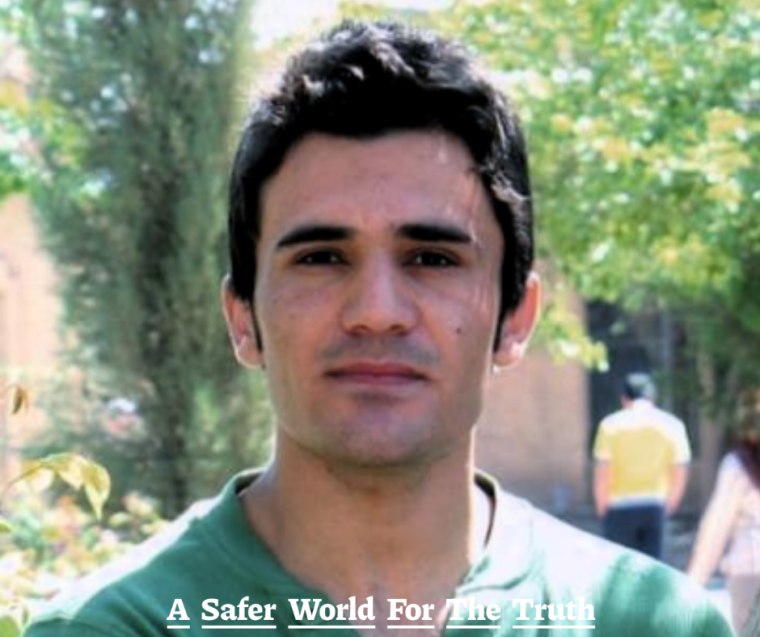Amsterdam, May 4 2022 — Kurdish authorities were likely directly involved in the 2010 kidnapping and murder of a young journalist, a newly published investigation by A Safer World for the Truth finds, and engaged after the fact in intimidation and harassment – indicative of a larger pattern of impunity and silencing of the free press in the region.
The investigation, “The Assassination of Sardasht Osman: Debunking the Official Story”, is the fifth in a series of investigations to push for local justice as part of the A Safer World for the Truth initiative, a project by leading press freedom organisations Free Press Unlimited, Reporters Without Borders and the Committee to Protect Journalists.
The group’s analysis of the “official investigation” revealed significant gaps and irregularities, including a failure to interview family members and friends. Instead they were threatened to remain silent and support the official storyline.
Iraq currently ranks 172nd out of 180 countries on the World Press Freedom Index. All the killers of murdered journalists in the Kurdistan Region of Iraq have operated with impunity, according to CPJ’s 2021 Global Impunity Index where Iraq is ranked third.
The murdered journalist, Sardasht Osman, worked in the Kurdistan Region of Iraq and wrote about corruption and nepotism. In December 2009, he wrote a satirical article, ‘I am in love with Barzani’s daughter’, in which he juxtaposed the luxurious lifestyle of President Massoud Barzani’s family with the hardships of average Kurdish citizens. Shortly after, he started receiving death threats.
Inconsistencies in the official storyline are most pronounced with regards to: the kidnapping of Sardasht, transporting Sardasht (or his body) from Erbil to Mosul, the official autopsy report, the allegation that the perpetrators were from the Ansar al-Islam terrorist group, and the alleged motive for his assassination, the A Safer World For The Truth investigation found.
“There are always people who don’t want to listen when you start telling the truth, who get furious at the slightest whisper. To stay alive though, we must tell the truth.
I will continue to write until the last minute of my life.”
-Sardasht’s personal response to threats prior to his assassination.
The case of Sardasht is illustrative of the fate of many young, critical journalists in Iraqi Kurdistan, including: Asos Hardi, Kawa Garmyani, Wedad Hussein and Soran Mama Hama. Since Sarshadt’s murder, at least 22 journalists have been killed in Iraq in connection to their work, eight of whom were killed in the Kurdistan Region of Iraq.
Furthermore, journalists like Sardasht who work in places with limited press freedom are often forced to self-censor to avoid crossing certain red lines that can trigger violence by authorities. Threats and attacks against these journalists are rarely investigated promptly, effectively and thoroughly..
In light of these findings, A Safer World for the Truth has published a series of concrete recommendations to the Kurdistan Regional Government (KRG) and to the international community:
First, Kurdish authorities must immediately end all harassment, intimidation, and threats against Sardasht’s family members and friends and initiate a transparent and impartial reinvestigation of the case of Sardasht Osman.
Second, advocates, particularly those with diplomatic and economic relations to the KRG, should exert continuous pressure on Kurdish authorities to investigate threats against and murders of journalists according to international standards.
Third, States should impose targeted sanctions on KRG officials and authorities for preventing prompt, effective, thorough, impartial and transparent investigations into crimes against journalists.
Finally, supporters of press freedom should join us in calling on the Kurdish authorities to develop a formal independent safety mechanism tasked with monitoring and acting on threats and attacks against journalists in Iraqi Kurdistan. By providing journalists and media workers with effective protective and preventive measures, we can begin to break the cycle of impunity.
Jules Swinkels, Lead Researcher for this investigation, Free Press Unlimited (FPU), states:
“The case of Sardasht is emblematic of what can happen when journalists push the boundaries of their confined freedom of expression. Sardasht wrote satirically about Kurdistan’s most powerful individuals, and was kidnapped and assassinated because of it. Tragically, his case demonstrates that a complete lack of political will to investigate and solve murders of journalists domestically, is one of the main reasons for impunity. The recommendations in this report provide a pathway to let justice prevail in cases of murdered journalists.”
Yeganeh Rezaian, Senior Researcher, Committee to Protect Journalists (CPJ), states:
“Reporters must be able to speak truth to power, uncover corruption, hold the powerful to account, and yes, satirize public figures without fear of intimidation, violence, and death. And when authorities pursue an agenda of persecution against journalists and tolerate impunity for their assailants, it is imperative they not be allowed to evade justice and prolong a campaign of violent censorship. This report offers a clear roadmap for how to address the case of Sardasht and ensure greater transparency and accountability for cases in the future.”
Sabrina Bennoui, Middle East Director, Reporters without Borders (RSF), states:
“Twelve years after the assassination of Sardasht Osman, the authorities still stick to their official version – which the journalist’s entourage has never believed in, regarding his writings critical of the government. The investigation was as opaque as it was expeditious and it is clear that it did not reveal the truth about the perpetrators and their real motives.”
Previous investigations and recommendations can be found here.
The full investigation, in English, Kurdish, and Arabic, can be downloaded here.
